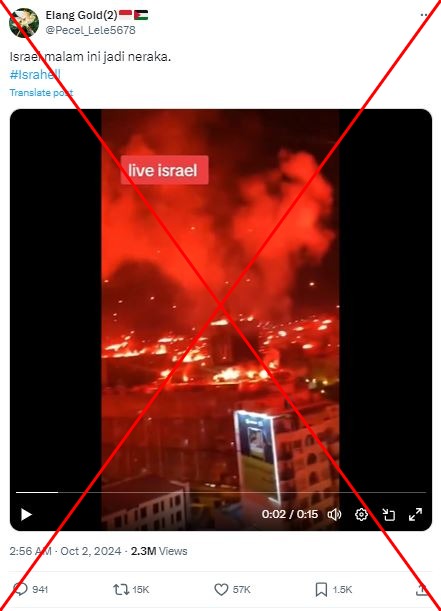In October 2024, social media was flooded with a video originally depicting a fireworks celebration in Algiers, Algeria, in 2020, which was misappropriated to suggest it was footage of an Iranian attack on Israel. This video gained tens of thousands of views alongside incendiary comments amidst escalating tensions in the Middle East as Iran launched a missile attack against Israel on October 1. The post, which stated, “Tonight, Israel becomes hell,” went viral and was circulated widely on platforms, falsely depicting the vivid display as part of Iran’s military aggression. Misleading captions, such as “live israel,” further obscured the video’s true context, prompting significant misinformation during an already chaotic time.
The backdrop to the video’s dissemination involved a series of violent exchanges between Iran and Israel. Iran justified its missile attack as retaliation for the killings of its militant leaders, amidst ongoing Israeli operations against Hezbollah in Lebanon. Observers remarked that this was the second direct attack from Iran against Israel in just a few months, following earlier retaliatory strikes that were aimed at retribution for Israeli airstrikes on Iranian interests in Syria. The rapid escalation in hostilities marked a critical point in a long-standing and volatile regional conflict, further complicating peace prospects.
Upon investigation, it was determined that the prominent video had been misattributed and predates the recent conflict altogether. The footage, first captured after CR Belouizdad’s victory in the Algerian football championship in 2020, reveals local fans celebrating with flares in the capital. Various analyses conducted by media organizations such as AFP clearly indicated the video originated from an event wholly unrelated to the Israel-Iran conflict. By utilizing reverse image searches and pinpointing geographic markers within the footage, AFP reaffirmed that the location and context of the clip had been heavily manipulated in its retelling online.
The original celebration featured identifiable elements like the grassy roundabout known as Place Al Mokrani and distinctive billboards characteristic of Algiers, providing concrete evidence that dismantled the false narrative. Screenshots reveal comparable visuals between the misleading posts and a Google Maps representation, further highlighting the discrepancies. AFP had previously addressed the same misinformation trend during the onset of the Israel-Hamas conflict a year prior, showcasing the persistent exploitation of unrelated imagery for propagandistic purposes.
The broader context of misinformation surrounding these conflicts underscores the critical role of accurate information in a landscape where false narratives can exacerbate tensions and misinform public perception. The ongoing fallout from the Israel-Hamas conflict, which erupted following a deadly attack by Hamas, has resulted in catastrophic casualties, highlighting the urgency for reliable reporting. As recorded by various metrics, violence has tragically escalated in both Israel and Gaza, with reports indicating thousands of civilian deaths on both sides, further complicating the already dire humanitarian situation.
Media organizations have made concerted efforts to counter misinformation, emphasizing the importance of fact-checking in maintaining journalistic integrity. The rapid spread of misleading content, particularly during volatile geopolitical events, poses significant challenges both for the media and public discourse. In response to this misinformation wave, organizations such as AFP have committed to debunking false claims, reinforcing the importance of accurate representations of events to foster a more informed public debate during an extremely fraught period in Middle Eastern history.

